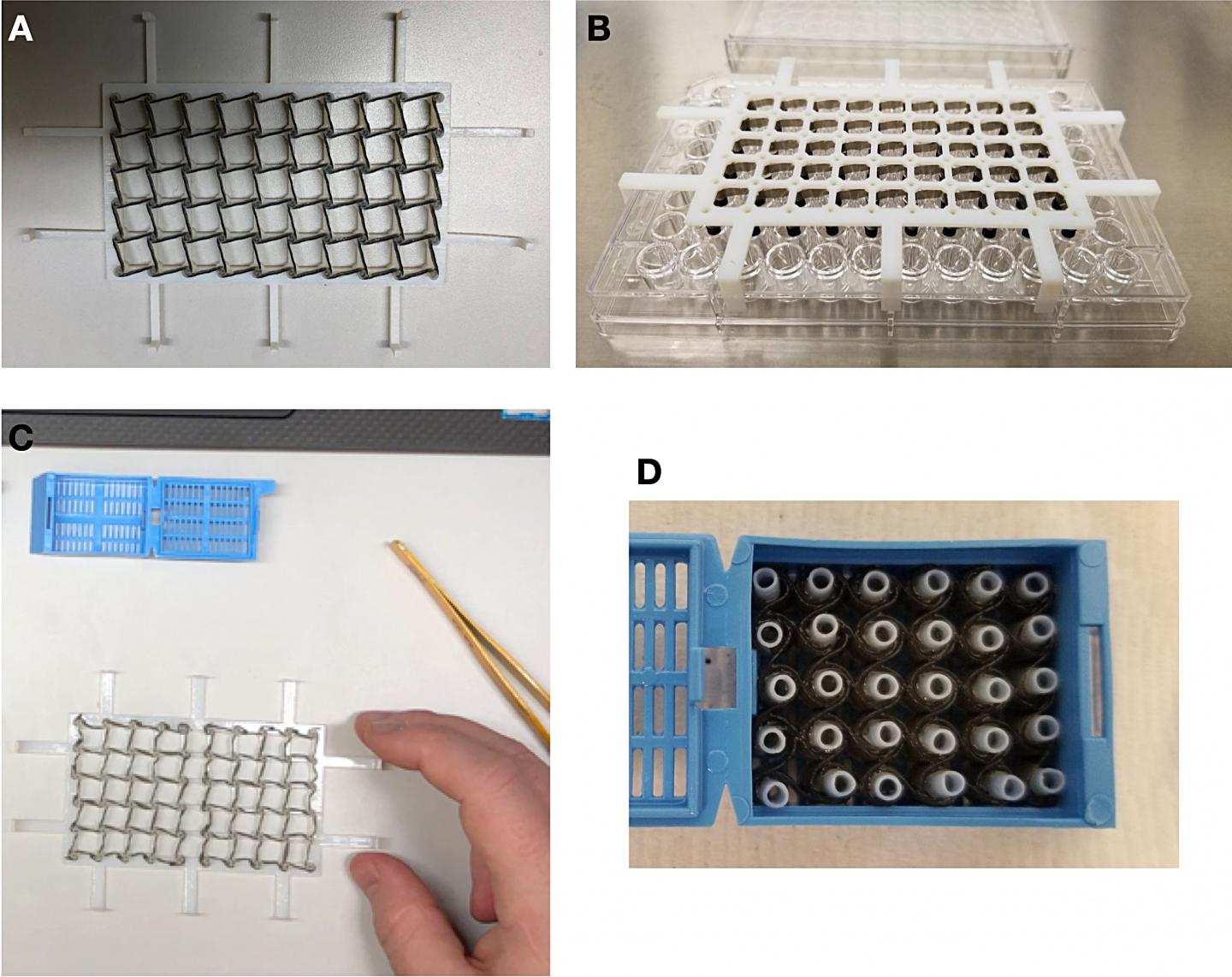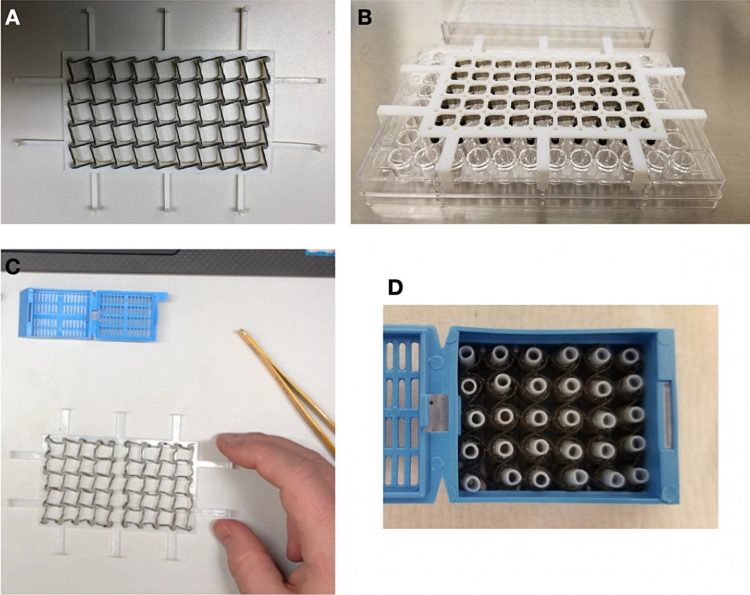
Credit: Bumsoo Han/Purdue University
WEST LAFAYETTE, Ind. – A drug discovery scientist typically screens up to 10,000 compounds in the early stages of developing one FDA approved drug. During this high-throughput screening, candidate compounds are initially tested on cell and tissue samples.
Such experiments are conducted using so-called multi-well plates where each of the wells acts as a test tube. Much of the initial screening process is automated – but one big exception is retrieving the cell and tissue samples from multi-well plates, typically 96 or more wells per plate, for further analysis in a microscope for histological analysis.
Now, Purdue University researchers have developed a collapsible basket technology to help speed up the process of retrieving the cell and tissue samples for histology analysis. This will significantly accelerate the analysis process when drug discovery scientists are developing new medicines or when health care professionals are searching for the best drugs for a given patient.
“Our collapsible basket array technology has big advantages for drug discovery and personalized medicine,” said Thomas Siegmund, a professor of mechanical engineering in Purdue’s College of Engineering. “With our collapsible basket array, cells and tissue now reside in fluid permeable microcontainers submerged in the wells of the plate. Microcontainers are attached to a flexible grid. That grid conforms in size not only to the well plate but also to a much smaller histology cassette where cells and tissue much reside for microscopy analysis.”
Siegmund said that with this new device the Purdue researchers not only contribute to a speed-up of process of creating new drugs by removing a time-consuming process step, but also reduce the error rate during tissue and cell transfer.
The Purdue technology is particularly compatible to an emerging technology for cell biology, pharmacology, toxicology and personalized medicines – 3D cell culture, where cells grow in 3D configuration better mimicking patient tissues. The 3D cell cultures can give scientists a much more accurate analysis of drug reactions in the body.
“There is increasing scientific interest in 3D cell cultures derived either from one particular cell type, called spheroids, or from natural and intentional mixtures of multiple cell types, known as organoids,” said Bumsoo Han, a Purdue professor of mechanical and biomedical engineering and program leader of the Purdue University Center for Cancer Research.
George Chiu, a Purdue professor of mechanical engineering and member of the team, said, “Our technology is designed to overcome the obstacles with the handling and analysis of 3D cultures. Those processes are typically laborious, mostly manual and with a low throughput. Increasing throughput can benefit both drug discovery as well as personalized medicine.”
The Purdue collapsible basket array is designed to be reconfigurable for high throughput culture and histological analysis, which involves studying the tissue and any associated diseases. Scientists and doctors often use such analyses to study patients with cancer to better examine tumors.
###
The National Cancer Institute funded the initial work on the technology.
The research team is working with Purdue Research Foundation Office of Technology Commercialization to patent the technology. The office recently moved into the Convergence Center for Innovation and Collaboration in Discovery Park District.
The researchers received support from the Trask Innovation Fund, a development program established to support projects that advance the commercial value of Purdue intellectual property. The fund makes awards twice a year to aid faculty and staff with their patented innovations that are being commercialized through OTC.
The researchers are looking for partners to continue developing their technology. For more information on licensing and other opportunities, contact Patrick Finnerty of OTC at [email protected].
About Purdue Research Foundation Office of Technology Commercialization
The Purdue Research Foundation Office of Technology Commercialization operates one of the most comprehensive technology transfer programs among leading research universities in the U.S. Services provided by this office support the economic development initiatives of Purdue University and benefit the university’s academic activities through commercializing, licensing and protecting Purdue intellectual property. The office is managed by the Purdue Research Foundation, which received the 2019 Innovation and Economic Prosperity Universities Award for Place from the Association of Public and Land-grant Universities. The Purdue Research Foundation is a private, nonprofit foundation created to advance the mission of Purdue University. Contact [email protected] for more information.
About Purdue University
Purdue University is a top public research institution developing practical solutions to today’s toughest challenges. Ranked the #6 Most Innovative University in the United States by U.S. News & World Report, Purdue delivers world-changing research and out-of-this-world discovery. Committed to hands-on and online, real-world learning, Purdue offers a transformative education to all. Committed to affordability and accessibility, Purdue has frozen tuition and most fees at 2012-13 levels, enabling more students than ever to graduate debt-free. See how Purdue never stops in the persistent pursuit of the next giant leap at purdue.edu.
Writer: Chris Adam, 765-588-3341, [email protected]
Sources: Thomas Siegmund, [email protected]
Bumsoo Han, [email protected]
George Chiu, [email protected]
Media Contact
Chris Adam
[email protected]





